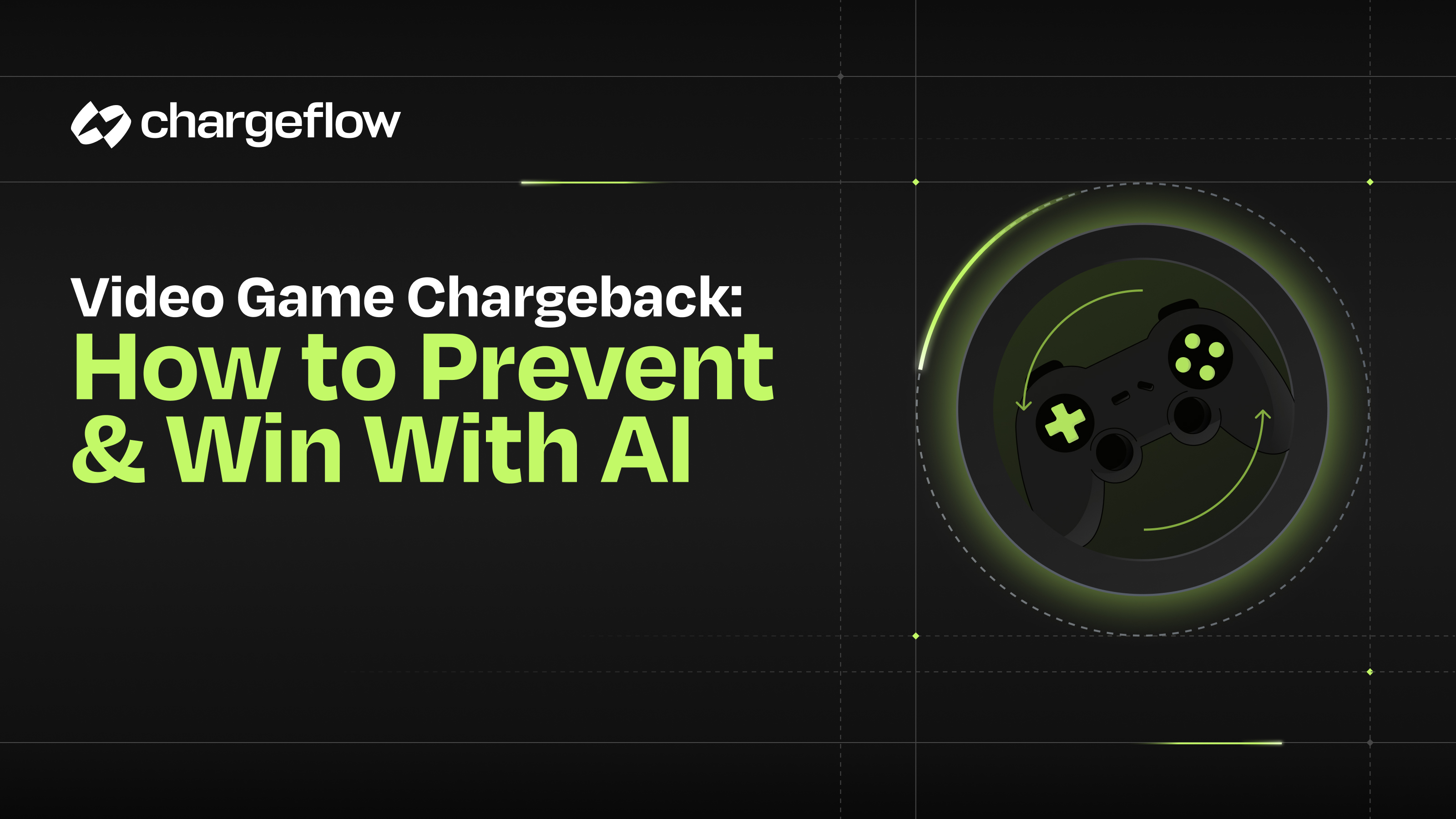7 Cardinal Reasons Merchants Lose Chargeback Disputes

Chargebacks?
No longer your problem.
Recover 4x more chargebacks and prevent up to 90% of incoming ones, powered by AI and a global network of 15,000 merchants.
Even though merchants can dispute meritless chargebacks and recover lost sales revenue, the chances of success are quite slim. Here's why.
eCommerce merchants have realized that treating chargebacks as a business expense is not sustainable.
Yet, many merchants get more chargeback dispute losses than wins. “On average, merchants only win 30 out of 100 chargebacks they decide to fight,” says eCommerce veteran, Ronak Shah.
Shopify merchant Bon writes (via the Shopify forum):
“Lately, we seem to be losing every chargeback. And it seems very unfair. These are real customers, and they don't seem to be setting out to commit fraud. They just seem lazy or people who become agitated easily. Yesterday I lost a case where a customer ordered the wrong size item, they contacted us and explained the issue. We said no problem and sent them a return mail label. They were not happy with that reply so they opened a chargeback. We explained to the bank that we shipped what the customer ordered and did all we could to make them happy. The bank sided with the customer and refunded their money, and we do not have the product and lost the shipping fee and other fees as well. This is one example of similar weekly occurrences.”
Stay with me as we dissect the seven cardinal reasons merchants, like Bon, lose chargeback disputes.
1. Not Understanding the Chargeback Reason Code
Chargeback reason codes are supposed to help merchants formulate requisite chargeback disputes. But they don’t always live up to that expectation. Seriously, chargeback reason codes are one of the reasons merchants lose chargeback disputes.
Here’s why:
- The networks do not have streamlined chargeback reason codes. Each card brand has distinct chargeback reason codes. While the principal purpose is to track and communicate cardholder disputes, having disjointed numerics is confusing.
- Chargeback reason codes do not reflect cardholders' true intent. The cardholder might tell their bank they did not authorize the transaction when, in reality, they’re trying to steal from the business.
- Chargeback reason codes lead to businesses using bad data for reporting and analytics. As Mastercard has noted, “When a friendly-fraud dispute is coded as genuine fraud, it can lead to an uptick in false declines—where cards are denied due to suspected fraud, even though they shouldn’t be.”
Using the chargeback reason code as a single source of truth in your chargeback dispute and fraud prevention is equally old school. Savvy eCommerce merchants are now going a step further. They’re using AI-assisted chargeback management to excavate insights from over 50 transaction data points to support their chargeback strategy.

2. Failure to Stick to Chargeback Dispute Guidelines
One of the most essential guidelines for disputing false and fraudulent chargebacks is abiding by the card networks’ chargeback time limits. Visa, Mastercard, Amex, and Discover have fixed timelines for every stage of the dispute cycle.
Visa or Discover chargeback response time limit for merchants is 30 days. Mastercard gives merchants a chargeback response time limit of 45 days for each stage of the dispute. But over at American Express, a merchant’s dispute response time limit for any chargeback phase is 20 days.
Your clock starts ticking from the day the dispute is filed. Hence, the day you receive the chargeback notice from your acquirer might not reflect the actual chargeback “Day One.” That shortens your response time.
Factor in the chances of misunderstanding the different time limits set by the various card networks, and it’s clear why merchants often run out of time to respond –and lose by default.
3. Lack of Compelling Evidence in Chargeback Disputes
Visa defines chargeback dispute compelling evidence as “proof the cardholder participated in the transaction, received the goods or services, or benefitted from the transaction.”
If you don’t have such documentation that convincingly establishes that a disputed bill is legitimate beyond a reasonable doubt, the chargeback dispute will be in vain.
Below are typical pieces of information that constitute compelling chargeback dispute evidence:
- Proof of purchase or transaction: This can be an invoice, receipt, or other ancillary transaction document that indicates what the cardholder purchased and the transaction amount charged.
- Proof of delivery or digital merchandise use: Documents like shipping receipts, tracking information, delivery confirmation, IP address, timestamps to streaming history, and activated product serial number are tangible proof of delivery and service use.
- Customer Communications: Examples of customer communication documents to support successful chargeback disputes include emails, chat logs, or recorded phone calls showing positive product reception or resolved disputes.
- Store policies and signed agreements: Chargeback disputes that lack evidence of store policy acceptance or signed agreements supporting the transaction are often unproductive.
- Primary data from previously non-disputed transactions: Under Visa Compelling Evidence 3.0, chargeback liability shifts to the card issuer if a merchant can provide:
- Device fingerprint, IP address, and account/login ID, or delivery address corresponding with previously undisputed transactions.
- Two or more previously uncontested or non-fraudulent transactions within 120 days of the dispute transaction.
- Fraud detection data: Your chargeback dispute evidence should equally include proof of authorization or identity verification.
The exact documentation outline might differ depending on the nature of the case you're dealing with.

4. Poor Business Practices
Chargeflow’s State of Chargebacks Report indicates that up to 80% of all chargebacks are friendly fraud. Yet, a tangible percentage of disputes are attributed to merchant missteps.
Regardless of the strength of your chargeback dispute, if you billed the merchant twice, for example, you will still lose the case.
Close all the loopholes that could trigger customer disputes. These are in two folds:
1. Pre-transaction due diligence
- Staff training on transaction processing best practices
- Adequate fraud prevention and customer authentication
- Accurate product descriptions to avoid expectations gaps
- Transparent pricing, billing, policy, and merchant information
2. Post-purchase assiduity
- Excellent customer service to prevent buyer’s remorse
- Transaction filling according to regulatory requirements
- Proper records keeping for readily available documentation
The list is by no means exhaustive. Understand how payments work for your industry. Improve your business practices. And ensure you’re not opening backdoors for scammers to commit online shoplifting.
5. Poor Relationship with Acquirer
Merchant acquirers process chargeback disputes on merchants’ behalf. A poor merchant–acquirer relationship can lead to lost cases, delayed chargeback response, inaccurate chargeback information, etc.
For example, a Nigeria fintech company Shago Payments recently dragged their acquirer Fidelity Bank to court over a series of chargeback fraud cases amounting to $50,658. Cardholders filed several chargeback claims against Shago between June and August 2023. Shago claims that Fidelity Bank “unilaterally resolved” the chargeback claims in favor of cardholders. While this incident is unusual and nuanced, it still reflects how a poor relationship with your acquirer can be problematic.
Working closely with your acquirer is vital as it helps you improve dispute remediation efforts. Acquirers have extensively more payment information than you do. They’ll help you understand chargeback causes better.
6. Ignoring Chargeback Alerts and Trends
Technology tools like Chargeflow alerts give merchants a head-start in chargeback processing. It helps you know about the case before it enters “day one,” so you can prepare for a chargeback dispute or contact the customer to resolve it.
Another incredibly essential tool for effective chargeback dispute is ChargeScore, a complementary solution from Chargeflow. It helps merchants calculate their chargeback win-lose probability based on historical data and customer behavior. That way, you’re not disputing friendly fraud chargebacks like someone boxing the air. Rather, you can quickly generate chargeback response templates to build air-tight cases.

7. Using Manual Chargeback Disputes
Chargebacks are traditionally cardholder centric. And the recent spike in technological innovations makes it even increasingly difficult for merchants to win disputes.
For instance, there’s been a growing report of scammers using AI to bypass certain fraud checks to make unauthorized transactions. Such cases are difficult to crack manually. Card brands already provide no-fault assurance to cardholders. The burden of proof is on you, the merchant, whenever they issue a chargeback. That explains why manual chargeback dispute success rates continue to fall (the best outcome is currently 12%).
Contrast that with automated chargeback management, where merchants are reporting dispute win rates of 75% to 85%. That’s not all. The labor input savings from chargeback automation versus manual is at least $4,500 monthly.
Using manual chargeback disputes makes you lose money. It can cause you to enter the card network monitoring program.
Elevate Your Chargeback Disputes: A Case Study of Elementor
Elementor is a world-renowned software development company primarily known for its plug-and-play WordPress website builder. Like most online businesses, chargebacks were more than an annoyance for Elementor. Indeed, chargebacks were a bottleneck, hindering operational efficiency and customer satisfaction, as each dispute took about 30 minutes to process manually.
That puts pressure on their team and resources. Elementor needed a solution to address the problem without requiring the amount of time they spent.
Enters Chargeflow, a transformation chargeback solution for global commerce.
Measurable Results Beyond Time Savings
After onboarding Chargeflow, the Elementor team saw tremendous, immediate results in their chargeback resolution process, including:
- Expedited Dispute Resolutions: Chargeflow significantly accelerated dispute resolution pace, cutting dispute processing time by 90%.
- Improved Win Rates: Elementor’s chargeback dispute success rates doubled.
- Reduced Operational Costs: Elementor reallocated resources more effectively, automating previously manual and time-intensive tasks.
These fantastic improvements streamlined Elementor's processes and enhanced its commitment to excellence and customer satisfaction. Read the full case study.
Make Your Chargeback Disputes Productive Today!
Chargebacks are a major headache, especially for eCommerce businesses. They drain revenue, damage your reputation, and, in severe cases, result in the loss of payment processing rights.
Even though merchants can dispute meritless chargebacks and recover lost sales revenue, the chances of success are quite slim. Now you know the seven cardinal reasons for unproductive chargeback disputes.
Make your chargeback disputes productive. Understand the reason codes, provide compelling evidence, stick to the guidelines, improve your business practices, collaborate with your acquirer, use chargeback alerts to stay ahead, and automate your disputes for better outcomes.

Chargebacks?
No longer your problem.
Recover 4x more chargebacks and prevent up to 90% of incoming ones, powered by AI and a global network of 15,000 merchants.






























.png)








